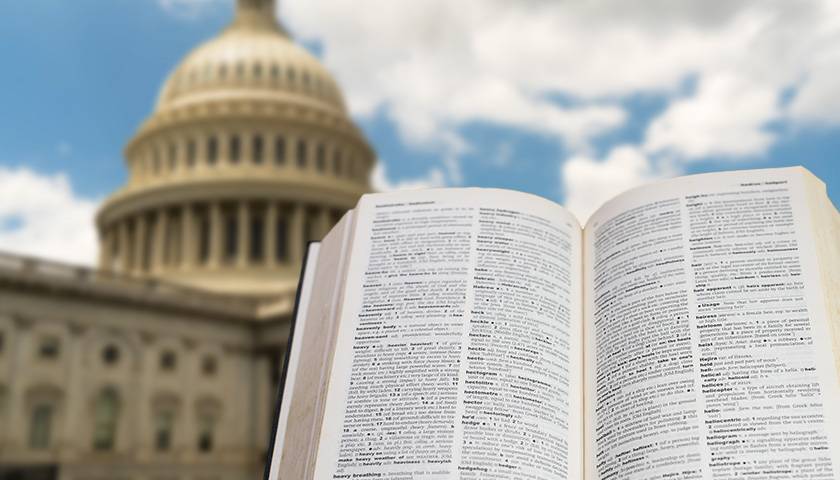by Jeff Minick
On his blog A Pilgrim in Narnia, Brenton Dickieson tells us that C.S. Lewis in his Studies in Words defined “verbicide” as the “murder of words.” Dickieson adds that “Lewis has some similar concerns as George Orwell in his ‘Politics and the English Language.’ Words can be politicized or bent into the service of those who are peddling products or ideas.”
The 21st century has given us a multitude of these vampires, who—having sucked the original meanings out of certain nouns and verbs—then use the carcasses to sell certain ideologies or to confuse the rest of us. Here is a partial list of these zombie words.
Liberal. The old-time liberalism typified by politicians like Hubert Humphrey has been pushing up daisies for decades. Once, liberalism meant supporting individual rights and freedoms, the free market, and limited government. In no shape or sense should “liberal” apply to any politician today in the Democratic Party. For the time being, we should put a toe tag on liberal as a political descriptor.
Conservative. This word is still breathing but on life support. For years now, a number of politicians and commentators claiming to be conservative have in fact been only a hop, skip, and jump behind the radical ideas of the left. A recent case in point: Those opinion makers who rail against a man identifying as a woman participating in female sports usually refer to that “woman” by his adopted female name. By that usage, they have already lost half the battle.
Moreover, what is it, exactly, conservatives wish to conserve? Conservatives are supposed to uphold Western tradition, culture, and values. But as the above example illustrates, many commentators and politicians can no longer even conserve the difference between men and women.
Republic. When asked what sort of government the Constitution had given Americans, Ben Franklin supposedly replied, “A republic if you can keep it.” We haven’t kept it. With the exception of the Pledge of Allegiance, where we vow fealty “to the Flag of the United States of America, and to the Republic for which it stands,” the word republic has long gone missing from common usage. Here’s a little experiment: Ask your friends or family members “What is a republic?” You’ll either be met with a blank stare or gobbledygook along the lines of that heard at a White House press briefing.
Several totalitarian nations—notably, the People’s Republic of China and the Democratic People’s Republic of Korea—have outright murdered what a republic actually is. Here in America, we’ve simply forgotten that a republic once meant a form of government where the citizens elect representatives to make decisions in government.
Democracy. Some people, most egregiously those who call themselves progressives, use the word democracy as a cudgel, beating down opposition by crying, “We must protect American democracy.” But if democracy means one person, one vote, then in the last few decades, and particularly in the last two elections, we have done a number on democracy. Democracy also means that no one is above the law, but given the many Hunter Bidens of our day, that idea is also in the boneyard.
Outside the political realm, other words have also seen their meanings mangled or sapped. Truth, beauty, goodness, virtue, manhood, woman, marriage, family: These and more are turned upside down in their meanings, blighted in their import, or mocked. “It is not just a verbicidal age, but we are verbicides,” writes Dickieson. “We are word-killing maniacs wandering around the digital library of culture with guns for tongues.”
From this mayhem of verbicide, however, springs some opportunities. For one, greater awareness can wake us from our lethargy. When politicians declare they want to protect us from attacks on “our democracy,” we might ask ourselves what they really mean. Are they sincere, or are they using democracy as a smoke screen to achieve some other goal?
We also have the chance to become amateur linguists, investigating, for instance, what the Greeks, Romans, and our own Founders meant by a republic. Robert A. Taft, Russell Kirk, Ronald Reagan, William F. Buckley Jr., and Thomas Sowell are all branded as conservatives. What do they have in common? What are their differences? If we want to come up with a working knowledge of other terms, we can follow this same process of investigation and so formulate some more accurate definitions.
Verbicide has serious consequences in our culture. When we don’t all understand the definitions of terms, it’s incredibly difficult to have honest discussions with those who are still open to such conversations. It also gives politicians and others among the elite more ways to lie to us: Selling one unpalatable idea under the guise of a more palatable term is a lot easier when our definitions are muddled.
One recent example of verbicide involves Bethany Mandel, author of Stolen Youth, a book about how woke ideology is destroying childhood. Bethany was asked during an interview to provide a basic definition of the word woke. She froze and was unable to reply straightaway. Her failure went viral, and in an article for Newsweek, she recounts the reasons for her “brain freeze.”
Some will sympathize with Mandel—I am one of them—but the lesson is painfully obvious. To prevent verbicide, we need to know the meaning of the words we use.
– – –
Jeff Minick is a contributor to Intellectual Takeout.
Photo “Dictionary” by astize. Background Photo “U.S. Capitol” by Thomas Lin.




